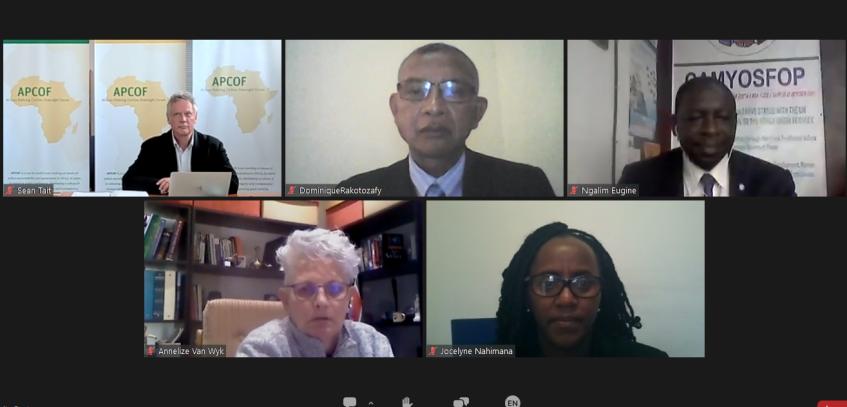The African Union Commission and the AU’s Economic, Social and Cultural Council (ECOSOCC) in partnership with the African Security Sector Network (ASSN) and African Policing Forum (APCOF), organized a virtual training for member states and Regional Economic Communities (RECs)/Regional Mechanisms (RM) engaged in Security Sector Reform, on Security sector oversight mechanisms, from 14-15 June 2022.
The training composed of senior officials and Civil Society Organizations representing member states and RECs including: Cameroon, Central African Republic, Ethiopia, The Gambia, Guinea Bissau, Kingdom of Lesotho, Madagascar, Mali, South Sudan, Economic Community of Central African States (ECCAS), Intergovernmental Authority for Development (IGAD), the Common Market for Eastern and Southern Africa (COMESA), The Community of Sahel-Saharan States (CEN-SAD) and the Eastern Africa Standby Force (EASF).
The training was based on the AU Security Sector Reform (SSR) Policy Framework adopted in 2013, which advises member states to commit themselves to strengthening instruments for democratic oversight of the security sector.
The two-day program trained participants on Security Sector Oversight Mechanisms in line with the AU SSR Policy Framework, the role of ECSOCC in influencing and monitoring SSR national strategies, in line with the Livingstone Formula and debate on role of Pan-African Parliament (PAP) in Security Sector Oversight on regional and national levels. In addition, the training discussed the possibility of development of an Operational Guidance Note on oversight and accountability.
Mr. William Carew, Head of the ECOSOCC Secretariat, stressed that CSOs play a contributory role in peace and security on the continent, according to the dictate of the PSC Protocol. He underscored the importance of building the institutional capacity of CSOs to make inputs into the policies and programs of the African Union, as the Section H of the AU SSR Policy Framework clearly highlights the crucial role of CSOs in democratic security sector oversight, along with the Livingstone Conclusion and other AU protocols.
Mr. Carew welcomed the joint collaboration with the DDR/SSR Division of the AUC and further announced a series of new trainings that ECOSOCC would roll out in the near future to better equip African CSOs.
Christopher Suna Kayoshe, Ag. Head DDR/SSR division noted that SSR was part of the broader flagship project of Silencing the Guns in Africa. He also emphasized that accountability and integrity were among the key aspects of security governance, that “It is for this reason that the AU, through its SSR Policy framework continues to advise member states to make themselves strengthen this document for democratic oversight of the security sector reforms, as well as broader governance.”
Over the past decade an institutional framework necessary to consolidate democratic security-sector governance has been established. This is, reflected in the AU and RECS level policy frameworks, guidelines, in legislation and regulations in institutions. However, the link between the established institutional framework on democratic security-sector governance, and practical application needs to be significantly strengthened to ensure its practical application and benefits.
During the two days training, participants enhanced their capacities on different themes including 1) Oversight and Accountability, challenges and opportunities, 2) the PAP Model law on policing as a case study in reflecting accountability and oversight in police governance; 3) National Security Policy strategies in effective Security Sector Governance 4) parliamentary Oversight, 5) Gender mainstreaming in SSR 6) the role of ECOSOCC and its national chapters to influence and monitor SSR national strategies, in line with the Livingstone Formula principle. Furthermore, participants shared their experiences on Security Sector oversight challenges, opportunities and needs in their respective fields.
Participants highlighted that capacity gaps should be addressed before designing and implementation of National Security Policies and SSR strategies. They also raised challenges related to SSR national ownership and financing SSR. The Civil Society Organizations recognized limitations to play their civilian oversight role due to deficit of capacities needed to understand the functioning of a sector where the principle of secrecy persists despite there being related continental and international governance frameworks.
While the responsibility for financing national SSR processes lies with member states, the nature of external support for SSR of member states should be well strategized and defined. Participants recommended the establishment of training institutions for permanent capacity building on security sector governance and to promote sharing experiences between AU member states in the framework of South-South cooperation principle. The enhancement of capacities of RECs to develop regional SSR policy frameworks like ECOWAS did, was highly recommended. Existing AU Operational Guidance Notes (OGN) on SSR and ECOSOCC Livingstone Formula concepts should regularly be popularized, and new knowledge management tools on security sector oversight should be developed.





